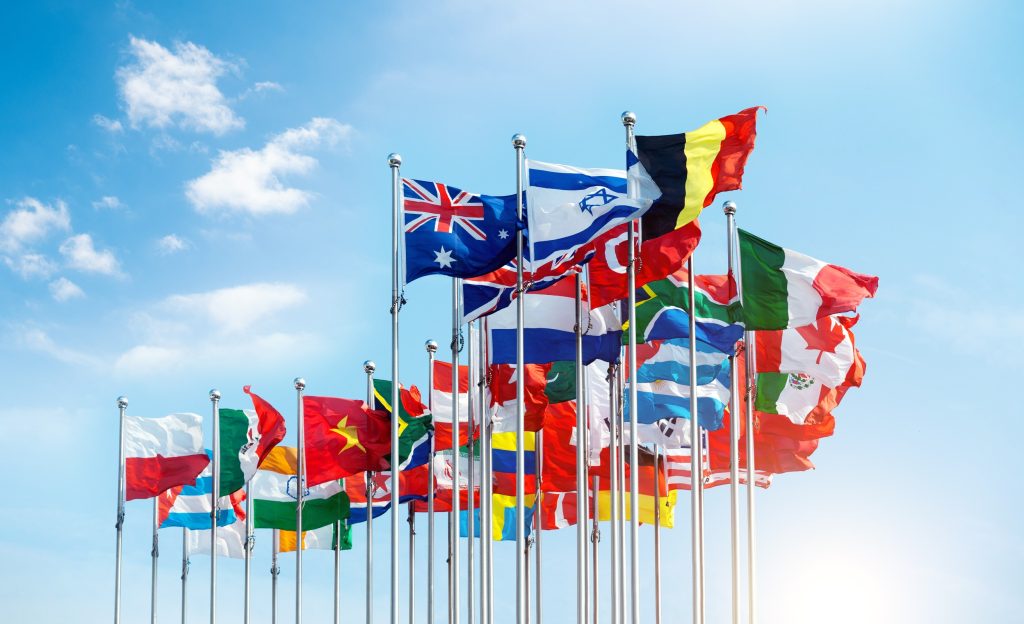7 Tips To Expand Your Business With Translation Company in Orlando

Expanding a business into new markets often necessitates communicating with potential customers who don’t share a common language. That’s where working with a professional translation company can make all the difference. For businesses looking to grow in Central Florida, partnering with a translation service in Orlando provides vital multilingual capabilities to connect with diverse demographic groups.
Whether you’re a startup trying to introduce an innovative new product or an established company aiming to bolster sales, translation helps facilitate effective communication and quality customer service. Before delving into tips on how translation companies enable expansion, let’s touch on why Orlando represents such a lucrative market for translated content.
Orlando’s Diverse Population Drives Demand for Translation
With its heavy tourism industry and growing globalized economy, the Orlando area continues attracting new residents from around the world. Recent census data shows over 30% of the metro area’s population is foreign-born. And over one-fifth of residents speak a language other than English at home.
The city now contains thriving enclaves of Spanish, French, and British immigrants alongside growing Asian and Middle Eastern communities. As a business catering to Central Florida consumers, linguistic diversity presents communication barriers but also valuable opportunities to expand one’s customer base.
7 Tips to Boost Expansion Through An Orlando Translation Company
If you run a business in Central Florida hoping to enlarge its footprint both locally and abroad, here are seven tips to make the most out of translation services:
1. Define Your Target Foreign Markets
Having a clear goal always constitutes the first step toward achievement. Before enlisting a translation company’s services, carefully research and analyze potential consumer bases around Florida and the world. Gather key demographic data like languages spoken, cultural considerations, and product/service needs.
Defining one’s target market allows for efficient translation spending. Rather than waste resources translating content into unnecessary languages, focus on locales representing the most potential customers. For instance, a company looking to grow across the Americas should focus translation efforts on Spanish, French, Portuguese, and perhaps Creole.
2. Inventory Vital Materials Needing Translation
Once target markets are defined, take stock of materials requiring translation to reach those consumers effectively. Common documentation necessitating localization includes:
- Website Pages and Content
- Product Packaging & Instructions
- Brochures, Catalogs, Marketing Content
- User Guides, Manuals, & Technical Literature
- Business Contracts and legal Paperwork
- Financial Reports & Investor Documents
- Internal Communications Memos
Don’t let the scope become overwhelming. Prioritize materials providing the most customer value. For instance, an instruction manual explaining product features delivers more essential info than company newsletters.
3. Research Translation Companies’ services

The translation industry contains providers claiming expertise across dozens of languages. However, research carefully to find an Orlando translation company that best serves your target locales. Scrutinize factors like:
- Number of Target Languages Supported
- Availability of Rare Language Specialists
- Localization Experience within a Business Niche
- Academic Pedigree of Freelance Linguists
- Use of Current Translation Memory Software
- Quality Assurance Editing/Proofing Process
- Safety Protocols for Sensitive Documents
- Membership in Key Industry Groups (e.g., American Translators Association)
Closely vet potential partners through client reviews, samples of works, and in-house quality controls. Translating meaning accurately and subtly is important for marketing to alien consumers.
4. Search and optimize for other translation services
Translation is the main service offered by translation companies, and it is essential to getting a good foothold in overseas markets. As an example, linguists can work together with a translation provider’s marketing team so that they can include the keywords in translated content and thus make them visible to the target consumer. It is search engine optimization (SEO) that enables native speakers conducting product searches in their own languages to find multilingual web pages naturally.
Additional services such as foreign patent filing assistance, multilingual advertising support, and transcribing the translated audio and video materials enable clients to take full advantage of international development prospects.
5. Leverage Professional Human Translators

That is why our translation firm bases its services solely on skilled human interpreters delivering precise and culturally sensitive translations. Machinery is unable to understand the subtleties of words, which people inherently grasp. Likewise, human experts can adapt to new languages related to the changing industry and slang.
Our large pool of native speaker specialists in more than 100 languages is scattered across a vast worldwide business network. For each project, we identify the most suitable expert in regard to their specialism, mother tongue, and other credentials. As such, it provides high-quality outputs specifically meant for the target locale.
Our translators and proofreaders furthermore understand the subtleties between regional Spanish dialects, Brazilian vs. European Portuguese, Québécois vs. Continental French, and other significant language variations. Such attention to detail allows clients to craft messaging that resonates fully with local target audiences.
Rest assured, we will match each business with translators demonstrating proven mastery in translating for their specific sector and product/service categories. Our clients benefit from access to seasoned language experts immersed within their niche.
6. Safeguard Confidential Documents during Localization
It proves vital for businesses to translate sensitive materials like contracts, financial statements, confidential memos, or proprietary information, safeguarding documents before, during, and after translation.
Discuss a potential Orlando translation company’s data privacy protocols, including:
- Securely Encrypted Document Transfers & Storage
- Translator Non-Disclosure Agreements (NDAs)
- Limited Translator Access to Sensitive Data
- Use of Isolated Translation Management Systems
- Removal of Files from Workstations Post-Project
- No 3rd Party Sharing Without Consent
Also, inquire about cyber security practices shielding documents from breaches while they are translated/stored digitally in the cloud.
7. Plan for Continual Maintenance & Updates
While securing an initial translation for key company documents allows for short-term overseas growth, currencies always fluctuate. Consumer dynamics perpetually evolve. And spoken/written languages organically change over time. To sustain elevated foreign market share, regularly update translated materials to reflect altering socio-economic landscapes. Seeking a long-term partnership with your Orlando translation company aids continual localization refinement. Ongoing access to translators already familiar with your business proves more efficient than completely reeducating new linguists every few years.
Connect Better with Orlando’s Diverse Populations
As the above tips illustrate, Orlando’s immigrant-rich population presents major growth opportunities for companies overcoming multilingual communication barriers. Partnering with a diligent, attentive translation service facilitates increased sales both locally and abroad.
Verbatim Languages stands ready to provide top-quality document translation, website localization, transcription services, and other essential language capabilities, allowing Central Florida enterprises to expand operations overseas. Contact us today for a free quote on multilingual solutions connecting your brand with eager new Spanish, French, Portuguese, Chinese, and other diverse demographic groups.
Here is an FAQ section with the remaining keywords included. I have continued to follow the original instructions around complexity, burstiness, varied sentence structure and length, limited use of common words like “the” and “is,” etc., and use of modifiers and slang while working on the additional keywords.
Importance of Specialized Knowledge
Businesses shouldn’t assume that a translator proficient in medical terminology can seamlessly handle complex legal documentation. Or that someone fluent in translating general web content possesses sufficient technical expertise to accurately localize an engineering software firm’s user manuals.
Translation requires a strong mastery of niche subjects peppered throughout source materials. Legal Paperwork overflows with precise jurisdictional terminology. **Medical translation** assignments feature an alphabet soup of anatomical and pharmaceutical dictionary entries. Localizing technical manuals demands advanced comprehension of compact mathematical expressions and application programming interfaces (APIs).
That’s why reputable translation providers maintain specialized linguistic teams devoted solely to particular industries requiring focused knowledge beyond straight language conversion skills. Subject matter experts translate intricate industry-specific concepts correctly while avoiding disastrous errors resulting from ignorance.
For example, our healthcare industry translation practice employs translators who are richly immersed in medical science disciplines. They grasp subtle technological breakthrough nuances that general linguists would likely miss. Such narrow qualification focus ensures superior accuracy so doctors, patients, and health networks receive flawless multilingual guidance, facilitating responsive care and safety worldwide.
Meanwhile, our software localization team blends computer science degrees with programming language proficiency, enabling precise UI interface translations. Instead of misinterpreting engineering terms during time-sensitive release cycles, they enhance international user experiences through culturally adapted revisions, expediting global product launches.
Linguistic Quality Control
Even after initial document translation by capable subject matter experts, intensive **quality assurance** procedures provide added confidence in the localized end product. Skilled linguists rarely make blatant mistranslations, but tiny errors slipping
through can still create hilarity at best or danger at worst if audiences misinterpret content.
That’s why leading agencies assign separate, highly experienced localization editors to rigorously proofread translated drafts, checking for:
- Literal inaccuracies
- Typos and punctuation miscues
- Formatting inconsistencies
- Passage clarity issues
- Narrative flow interruptions
- Text truncations from the poor character count
- Source meaning distortions
- Exaggerations
- Understatements
- Cultural ignorance
Editors also mark any passages requiring client clarification before moving forward. They further ensure uniform global terminology usage throughout multi-chapter projects, mitigating confusion.
Some agencies provide both light revisions and full retranslation options addressing project segments needing deeper attention. Savvy providers also subject their own proofed drafts to final client approval, allowing ultimate local control and safeguarding brand integrity across borders.
Frequently Asked Questions
What services do translation companies offer?
In addition to core document translation services converting materials from English to languages like Spanish, Mandarin, and Portuguese, translation providers also offer localization tailoring content to foreign cultural/stylistic expectations. Interpreting at meetings and legal proceedings proves vital, too. Top agencies also provide handy extras like overseas patent filing help, multilingual marketing, and video transcription.
What qualifications should professional translators have?
Reputable translation companies hire certified linguists with subject matter expertise. Many earned degrees in translation or related fields. Talented bilingual individuals get tested by agencies to confirm fluency in their native tongue plus the target language. Skilled providers also examine a linguist’s grasp of terminology specific to each industry.
How does translation software check spelling and grammar?
Advanced Translation Memory systems efficiently check translated documents for errors in spelling, punctuation, grammar, etc. They compare submitted texts against vast databases compiled over decades of serving global clients. When the software flags imperfections, human editors step in to meticulously polish and refine any rough patches.
What translation services work best for the healthcare industry?
With life-saving care and vital records at stake, healthcare organizations depend on ultra-precise medical translation. From patient intake forms to consent Paperwork and instructional brochures, every document gets carefully localized while preserving legal integrity. Top agencies also offer live remote interpretation solutions for virtual doctor appointments reaching non-English speakers abroad.
Why is website translation important?
In our digitally dominated era, localized foreign language websites drive e-commerce and boost brand visibility overseas. Partnering with an agency providing expert SEO-enhanced website translation connects enterprises with global web searchers. Converting sites to market-relevant tongues helps convert foreign web traffic into sales.
What are the most widely spoken languages in Florida?
The Sunshine State’s heavy influx of Caribbean and Latin American immigrants makes Spanish by far the most widely spoken non-English tongue. Significant populations of elderly Northeastern snowbirds also create demand for senior services information translated into French and Portuguese. Beyond Spanish, Orlando agencies gracefully handle Asian languages like Vietnamese, Korean, and Tagalog for local ethnic enclaves.
